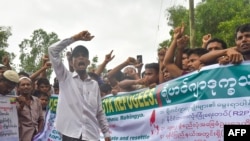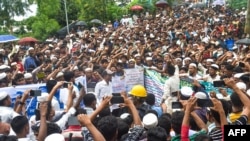Thousands of Rohingya refugees Sunday held peaceful rallies in Bangladesh, saying they wanted to return to Myanmar, which they fled amid waves of ethnic and religious persecution dating to 1978.
Just a day before World Refugee Day, the Rohingya Muslims, who live in 34 crowded camps in Bangladesh’s southeastern district of Cox’s Bazar, staged demonstrations under the banner “Let’s go home.”
Amid intermittent rain, they were seen marching on the dirt roads that meandered through the camps, chanting slogans and holding placards.
The Rohingya handed out leaflets with a 19-point demand that includes their safe repatriation to Myanmar at the earliest opportunity and the cancellation of that country’s controversial 1982 law that does not recognize them as citizens.
While some camps held small rallies, a much larger one involving about 10,000 people took place at Kutupalong.
At the camp’s football field, Mohammad Zubair, a Rohingya leader, asked the crowd, “Do you want to go back to Arakan?”
The crowd replied in unison, “Yes, we want to go back.”
Arakan is another name for Myanmar’s western Rakhine state, where the military launched its crackdown on the ethnic Muslim Rohingya minority in 2017. An estimated 700,000 Rohingya fled across the border to the refugee camps in Bangladesh. Myanmar is predominantly Buddhist.
Failed repatriations
Even though the Rohingya expressed a desire to return to Myanmar, Bangladesh’s attempts to repatriate them have failed at least twice in the last five years. Since fleeing the military crackdown, which the United Nations said Myanmar conducted with “genocidal intent,” these Rohingya refugees have been living in the Bangladeshi camps with minimal facilities, no work and little access to education.
In March, U.S. Secretary of State Antony Blinken determined that the military in Myanmar, also known as Burma, committed genocide and crimes against humanity against the Rohingya.
Myanmar has faced sanctions from the United States and other countries over the treatment of the Rohingya as well as a military coup that overthrew the democratically elected government of Aung San Suu Kyi in February 2021. Military officials claimed fraud in the November 2020 vote, which Suu Kyi’s National League for Democracy won in a landslide.
Myanmar’s electoral commission denies the allegations.
Zubair, who is a leader of the Arakan Rohingya Society for Peace and Human Rights (ARSPH), a camp-based organization working for the rights and justice of Rohingya people, said the Rohingya want a change in the status quo.
“We don’t want to live here in Bangladesh as refugees. We want the world to put pressure on Myanmar so that they create acceptable conditions for our return home,” he told VOA.
“We have arranged these rallies to mark the World Refugee Day and remind the world that we have all the desire to go back to our homeland if our dignified return is ensured,” Zubair said.
For that, the ARSPH leader said, the Myanmar government should first recognize them officially as “Rohingya.”
“We also want our properties in Arakan state back. We simply want basic rights and freedoms enjoyed by other communities of the nation,” Zubair added.
Nur Mohammad, another Rohingya leader, said the message from Sunday’s rally was simple.
“We wanted to tell the world that the Rohingya are citizens of Myanmar. The state of Arakan is our birthplace. And we want to return to our homeland,” he said.
Not a new campaign
The campaign by the refugees was started in 2019 by Rohingya leader Mohib Ullah. He was shot and killed in the Kutupalong camp in September.
Last week, Bangladesh police arrested 15 Rohingya in connection with his death and are searching for 14 others.
Ullah was the former chair of ARSPH and rose to prominence in 2019 for organizing a 100,000-strong rally in the Kutupalong camp, where he demanded justice for “Rohingya genocide” and a “dignified return” to Myanmar.
Since that massive rally, the Rohingya were banned from organizing large-scale gatherings inside the camp.
Shamsud Douza, a Bangladesh refugee relief and repatriation commissioner, told VOA that they allowed the Rohingya to organize Sunday’s rallies to mark World Refugee Day.
“Rohingyas from different camps were rallying independently to demand repatriation. The largest one was organized from the Kutupalong camp. Our law enforcement forces closely monitored the whole situation,” he said, adding that the rallies were peaceful.
About the possibilities of their repatriation, Douza said, “It’s a complex matter. Rohingyas have expressed their desire to go back — that much, I can say.”
Maung Zarni, a Britain-based Burmese human rights activist, told VOA that as long as the military, which has “institutionalized the intentional destruction of Rohingyas,” is in power, “the repatriation has zero chance.”
Zarni, co-founder of the Free Rohingya Coalition, said Bangladesh needs to realize that its policy of “focusing 100% on repatriation has proven to be a complete failure.”
“Repatriation has been tried in every single wave since 1978 but look at the greatest number of Rohingyas who came back to Bangladesh to seek refuge from the genocidal violence and destruction in [the] 2016 and 2017 waves,” he said.
Zarni said Bangladesh needed to stop viewing the Rohingya as a “burden” dumped on them by Myanmar and instead consider them as a “persecuted people who need to be empowered and supported.”
Abdul Aziz from Cox’s Bazar contributed to this report.





